MSc Forensic Science
ApplyKey facts
- Start date: September
- Accreditation: Chartered Society of Forensic Sciences
- Study mode and duration: 12 months full-time
Ranked no.1 in the UK for Chemistry (The Guardian University Guide 2026)
Places: 70
Study with us
- longest running MSc Forensic Science course in the UK
- accredited by the Chartered Society of Forensic Sciences
- participate in a major practical crime scene and courtroom exercise
- input by forensic practitioners and professional scientists
- choose to specialise in forensic biology or forensic chemistry in second semester
The Place of Useful Learning
UK University of the Year
Daily Mail University of the Year Awards 2026
Scottish University of the Year
The Sunday Times' Good University Guide 2026
Why this course?
You’ll join a global network of Strathclyde forensic science graduates who are in highly respected positions all over the world. In addition to preparing you for life as a forensic scientist, you’ll also graduate with a wide range of practical skills, problem-solving skills, and investigative thinking, relevant to a wide range of careers.
You'll benefit from the expertise of our enthusiastic teaching staff who also conduct forensic science research and casework. Studying in the Centre for Forensic Science offers a unique experience, combining ‘case-based’ learning with research-led teaching.
Course video
Hear from the course coordinator and students about our MSc in Forensic Science.

What you'll study
You'll cover core aspects of forensic science in Semester 1 including:
- preservation and recovery of evidence at a crime scene
- assessment and analysis of a wide range of evidence types
- legal systems, quality assurance, and ethical considerations of forensic science
- the interpretation, statistical evaluation, and reporting of evidence
The focal point of the first semester is our major crime scene exercise, in which you investigate simulated outdoor crime scenes, collect and analyse the evidence from those scenes, and then present this in Glasgow Sheriff Court in conjunction with students training in Strathclyde Law School.
Following the general introduction in Semester 1, you can choose to specialise in either forensic biology or forensic chemistry.
As a forensic biologist you’ll study a range of topics including:
- investigation of assaults
- biological trace evidence
- DNA profiling and DNA mixture/kinship analysis
- investigation of sexual offences
If you choose to specialise in forensic chemistry, you’ll develop expertise in:
- analysis of illicit substances
- toxicology and alcohol analysis
- investigation of fires and explosives
- analytical chemistry for forensic scientists
Research project
In Semester 3, you undertake a three-month project.
You may have the opportunity to complete the project in an operational forensic science laboratory or another University laboratory, either in the UK or overseas (subject to visa/nationality/residency requirements). Alternatively, you may complete your project within the Centre for Forensic Science, under the supervision of our team of academics.
Examples of institutions where Strathclyde students have previously undertaken their project include:
- Scottish Police Authority Forensic Services, UK
- Eurofins Forensic Services, UK
- Cellmark Forensic Services, UK
- Leverhulme Research Centre for Forensic Sciences, UK
- Office of the State Pathologist, Ireland
- Flinders University, Australia
- Arizona State University, USA
Course awards
Prizes are awarded for the best biology student and best chemistry student, and for the best project.
Practitioner Lecture Series
This course offers the fantastic experience of gaining first-hand accounts of forensic science in action through our practitioner and forensic-related professionals lecture series.
Renowned practitioners and professionals providing these lectures include:
- Peter Maskell, Senior Forensic Toxicologist, University of Glasgow
- Jim Govan, Retired Firearm Examiner, Scottish Police Authority Forensic Services and Terminal Ballistic Consultant to Deer Commission Scotland (now Scottish Natural Heritage)
- Alan Gall, Former Chief Superintendent and Divisional Commander, Strathclyde Police (now Police Scotland)
- Graham Cairns, Former Chief Superintendent and Divisional Commander, Strathclyde Police (now Police Scotland)
- Dr John Clark, Retired Forensic Pathologist, University of Glasgow
- Liana Hill, Forensic Nurse Examiner Programme Director, Crisis Services of North Alabama
- Professor Angela Gallop, CBE, Visiting Professor, University of Strathclyde
- Dr Debra Carr, Defence and Security Accelerator, Ministry of Defence
- Jonathan Honeyman and Phoenix (Fire Investigation Search Dog), Fire Investigation Unit, Scottish Fire and Rescue Service
- Dr Andrew Forgie, Forensic Odontologist, Glasgow Dental Hospital and School, University of Glasgow
- Angus Crawford, Senior Procurator Fiscal, Crown Office and Procurator Fiscal Service
Accreditation
Our MSc degree in Forensic Science is accredited by the Chartered Society of Forensic Sciences, demonstrating our commitment to meeting their high educational standards for forensic science tuition. The Chartered Society of Forensic Sciences is a professional body with members in over 60 countries and one of the oldest and largest such associations in the world.
Athena Swan Award
The Department of Pure & Applied Chemistry has been awarded the Athena Swan Silver Award in recognition of our commitment to advancing gender equality in Chemistry.
Facilities
Teaching takes place in the Centre for Forensic Science – a modern purpose-built laboratory for practical forensic training.
It's equipped with state-of-the-art instrumentation for analysis of a wide range of evidence types.
Facilities include a forensic microscopy suite, DNA profiling and forensics genomics laboratory, analytical chemistry laboratory, blood pattern analysis room, and a suite for setting up mock crime scenes.
Chat to a student ambassador
Want to know more about what it’s like to be a Science student at the University of Strathclyde? A selection of our current students are here to help!
Our Unibuddy ambassadors can answer all your questions about courses and studying at Strathclyde and offer insight into their experiences of life in Glasgow and Scotland.
Professional & Career Skills (10 credits)
This module aims to provide you with the transferable skills that will enable you to be successful in a professional environment, either within or out with forensic science. You will gain valuable insight from forensic practitioners, learn how to develop key problem-solving skills and will be encouraged to consider your future careers with regards to employability and workplace culture.
Essentials of Forensic Science: theoretical (20 credits)
This module is designed to provide you with a broad knowledge of forensic science on which you can build more specialist knowledge in Semester 2. You will be introduced to the legal system and the context of forensic science. A range of evidence types will be introduced and you will learn how evidence is analysed, exploring the interpretation of evidence, including Bayesian approaches and its value in an investigative setting. You will be introduced to quality assurance and encouraged to consider ethical considerations in forensic science.
Essentials of Forensic Science: practical (20 credits)
This module is designed to provide you with a foundation of knowledge and skills in forensic science on which you can then build more specialist knowledge. This practical module aims to provide you with experience of a wide range of techniques used for the location, recovery, and analysis of forensic evidence.
Practical Crime Scene Exercise (20 credits)
This module aims to consolidate learning from across the first semester and apply this in the context of a criminal investigation. This includes a one-day outdoor crime scene investigation and development of a forensic strategy for the subsequent examination of recovered evidence in the laboratory. Crime scene teams will brief the investigation team on how their forensic strategy develops and keep them updated about the scientific findings in the case. In Semester 2 you will give oral testimony in a real court setting, in an exercise run with the University of Strathclyde Law School.
Forensic Biology 1 (10 credits)
The specialist modules in Forensic Biology introduce students to the methods and practices used in forensic biology laboratories as well as the underlying theory. You will be encouraged to consider how these are integrated and used in the justice system and in criminal investigations. This module considers the investigation of violent crime and enables you to develop your critical thinking and planning skills. You will also explore data types and their statistical analysis, and how to effectively write a scientific paper for publication.
Forensic Biology 2 (20 credits)
The specialist modules in Forensic Biology introduce students to the methods and practices used in forensic biology laboratories as well as the underlying theory. You will be encouraged to consider how these are integrated and used in the justice system and in criminal investigations. This module considers the analysis and interpretation of DNA evidence and DNA mixtures, biological trace evidence, and the investigation of sexual offences.
Forensic Chemistry 1 (10 credits)
The specialist module in Forensic Chemistry introduces students to the methods and practices used in forensic chemistry laboratories as well as the underlying theory. You will develop your skills in interpreting chemical data to help identify unknown compounds using commonly utilised analytical techniques and how to statistically evaluate the data. You will also explore data types and their statistical analysis, and how to effectively write a scientific paper for publication.
Forensic Chemistry 2 (20 credits)
The specialist modules in Forensic Chemistry introduce students to the methods and practices used in forensic chemistry laboratories as well as the underlying theory and students are encouraged to consider how these are integrated and used in the justice system and criminal investigations. This module considers drug evidence and its analysis, analysis and interpretation of toxicological and alcohol evidence and the investigation of fires and explosives. This will enable you to develop your critical thinking and planning skills when working through a case study.
Practical Assessment in Optional Classes (20 credits)
This module is designed to provide practical experience for content covered in either Forensic Biology 1 and 2 or Forensic Chemistry 1 and 2.
Research Project (60 credits)
This module addresses the rationale and methodology behind conducting a research project in forensic science. During this module you will produce a research plan, develop the methodology to conduct a specific research study supported by relevant literature, and present your findings in both written and oral form for assessment.
Learning & teaching
The programme is taught using a wide range of delivery methods, including online and face-to-face lectures, workshops and tutorials, case studies, guest lectures, practical laboratory classes, simulated crime scene exercises, casework exercises, courtroom exercises, and laboratory-based research.
Assessment
A wide range of assessment methods are utilised, including written coursework, laboratory reports, quizzes, data analysis exercises, scientific writing exercises, court reports, case files, oral presentations and formal written examinations.

Vallary Mayer
This program allowed me to take the theory we learnt in lecture and apply it hands-on in real life scenarios, following evidence all the way from the crime scene to the courtroom.

Eimear McLaughlin
I developed a wide range of technical and professional skills, including the use of analytical techniques such as GC-MS, FTIR, and microscopy, as well as evidence handling, crime scene examination, and interpretation. I also particularly enjoyed the crime scene to court exercise, which offered a comprehensive overview of the forensic process.
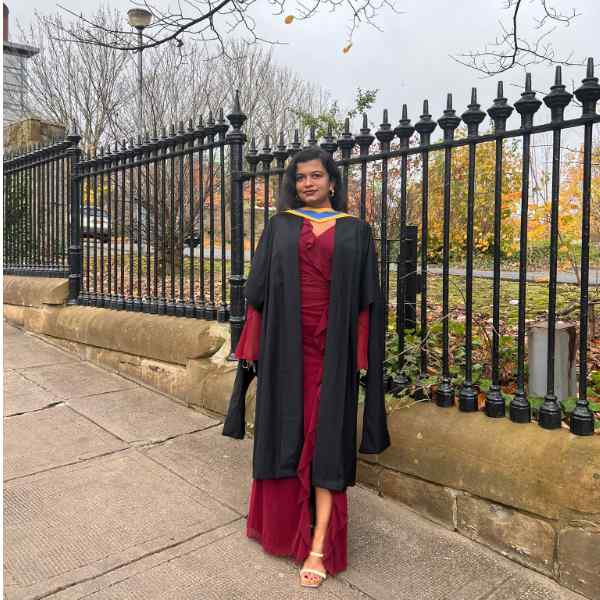
Shradha Satheesh
Strathclyde’s programme stood out for its emphasis on real-world application, offering an immersive experience that included courtroom simulations and crime scene activities. This practical focus not only made the learning engaging but also directly prepared me for challenges in the field.

Noah Schafnitz
I thoroughly believe my time at Strathclyde has equipped me with the tools I need to achieve my goal of becoming an excellent forensic scientist. I am confident that the skillset I have developed at Strathclyde will allow me to transition nicely into the professional space.
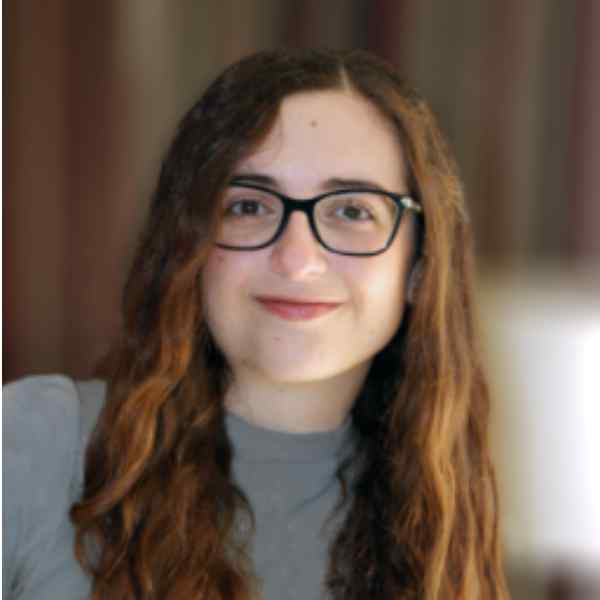
Anne Grima
When I was looking for Masters courses, I came across the MSc Forensic Science at Strathclyde, and instantly fell in love! The vast amount of theory coupled with the hands-on practical work, which included a mock crime scene and mock court case, were very appealing.
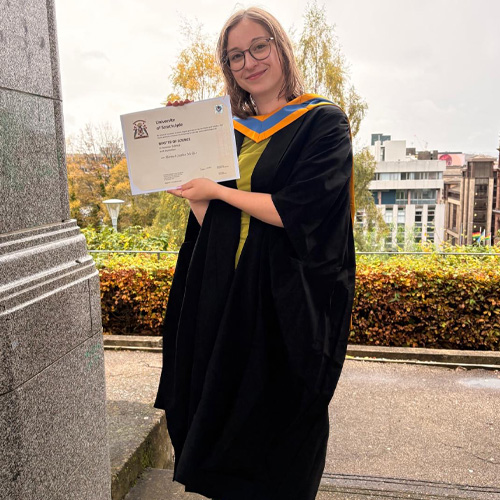
Hannah Nicklas
I got a lot of hands-on experience in many different techniques and processes, starting with recovering evidence from a crime scene to actually analysing samples in the lab. It was also the first time I learnt to write a court report and how to present it.
Entry requirements
| Academic requirements/experience | Minimum second-class (2:2) Honours degree, or international equivalent, in a relevant science subject such as:
Prospective students with relevant industry/practitioner experience are also welcome to apply. |
|---|---|
| English language requirements | IELTS 6.5 is required for all non-English speakers for entry to the MSc programme, with a minimum of IELTS 5.5 for all components including speaking, listening, reading and writing. As a university, we now accept many more English language tests in addition to IELTS for overseas applicants, for example, TOEFL and PTE Cambridge. View the full list of accepted English language tests here. |
| Other information | In the course of forensic examinations, there's a potential for exposure to body fluids from hepatitis sufferers and prospective students should consider hepatitis B immunisation (this takes from four to six months to be effective). |
Pre-Masters preparation course
The Pre-Masters Programme is a preparation course held at the University of Strathclyde International Study Centre, for international students (non-UK/Ireland) who do not meet the academic entry requirements for a Masters degree at University of Strathclyde.
Upon successful completion, you'll be able to progress to this degree course at the University of Strathclyde.
Fees & funding
All fees quoted are for full-time courses and per academic year unless stated otherwise.
Fees may be subject to updates to maintain accuracy. Tuition fees will be notified in your offer letter.
All fees are in £ sterling, unless otherwise stated, and may be subject to revision.
Annual revision of fees
Students on programmes of study of more than one year (or studying standalone modules) should be aware that the majority of fees will increase annually.
The University will take a range of factors into account, including, but not limited to, UK inflation, changes in delivery costs and changes in Scottish and/or UK Government funding. Changes in fees will be published on the University website in October each year for the following year of study and any annual increase will be capped at a maximum of 10% per year. This cap will apply to fees from 2026/27 onwards, which will not increase by more than 10% from the previous year for continuing students.
| Scotland | £15,300 |
|---|---|
| England, Wales & Northern Ireland | £15,300 |
| Republic of Ireland |
If you are an Irish citizen and have been ordinary resident in the Republic of Ireland for the three years prior to the relevant date, and will be coming to Scotland for Educational purposes only, you will meet the criteria of England, Wales & Northern Ireland fee status. For more information and advice on tuition fee status, you can visit the UKCISA - International student advice and guidance - Scotland: fee status webpage. Find out more about the University of Strathclyde's fee assessments process. |
| International | £34,100 |
| Available scholarships | Take a look at our scholarships search for funding opportunities. |
| Additional costs | Course materials Project
These costs will vary depending on whether you remain in Glasgow during this time or choose to complete your project elsewhere. The Department of Pure & Applied Chemistry provides travel scholarships to eligible students who must travel as part of their project. Crime scene exercise Towards the end of the first semester there's a crime scene exercise which is held outdoors. We suggest you bring warm clothing, waterproof outerwear and appropriate footwear for wet and muddy conditions. International students If you are an international student, you may have associated visa and immigration costs. Please see student visa guidance for more information. Other costs
|
Please note: the fees shown are annual and may be subject to an increase each year. Find out more about fees.
How can I fund my course?
Scottish postgraduate students
Scottish postgraduate students may be able to apply for support from the Student Awards Agency Scotland (SAAS). The support is in the form of a tuition fee loan and for eligible students, a living cost loan. Find out more about the support and how to apply.
Don’t forget to check our scholarship search for more help with fees and funding.
Students coming from England
Students ordinarily resident in England may be to apply for postgraduate support from Student Finance England. The support is a loan of up to £10,280 which can be used for both tuition fees and living costs. Find out more about the support and how to apply.
Don’t forget to check our scholarship search for more help with fees and funding.
Students coming from Wales
Students ordinarily resident in Wales may be to apply for postgraduate support from Student Finance Wales. The support is a loan of up to £10,280 which can be used for both tuition fees and living costs. Find out more about the support and how to apply.
Don’t forget to check our scholarship search for more help with fees and funding.
Students coming from Northern Ireland
Postgraduate students who are ordinarily resident in Northern Ireland may be able to apply for support from Student Finance Northern Ireland. The support is a tuition fee loan of up to £5,500. Find out more about the support and how to apply.
Don’t forget to check our scholarship search for more help with fees and funding.
International students
We've a large range of scholarships available to help you fund your studies. Check our scholarship search for more help with fees and funding.
International students
We've a thriving international community with students coming here to study from over 140 countries across the world. Find out all you need to know about studying in Glasgow at Strathclyde and hear from students about their experiences.

Careers
Most forensic scientists in Scotland are employed by the Scottish Police Authority Forensic Services.
In the rest of the UK, forensic scientists are employed by individual police forces, private forensic science providers such as Eurofins Forensic Services, Cellmark Forensic Services, Key Forensics, or government bodies such as the Defence Science Technology Laboratory (DSTL).
Outside of the UK, forensic scientists may be employed by police forces, government bodies or private companies.
Forensic scientists generally specialise in specific areas such as biology, chemistry, crime scene examination, DNA analysis, drug analysis, fire investigation.
Most of the work is laboratory-based but crime scene examiners/managers and experienced forensic scientists will also attend crime scenes and give evidence in court.
Graduates of the programme also follow a wide variety of careers in related fields, including analytical chemistry and molecular biology, as well as going on to do PhDs and pursuing research careers.
Careers Service
Our Careers Service provides career information, advice and guidance to help our students and graduates achieve their career goals. Support is also provided to graduates up to five years after graduation. The Careers Service team regularly hosts on-campus seminars and events, providing opportunities for students and graduates to network with employers and industry professionals.
Glasgow is Scotland's biggest & most cosmopolitan city
Our campus is based right in the very heart of Glasgow. We're in the city centre, next to the Merchant City, both of which are great locations for sightseeing, shopping and socialising alongside your studies.
Life at Strathclyde
Our students Maria and Tina tell us about their experience of studying the MSc in Forensic Science at Strathclyde.
From the moment I stepped foot in Glasgow I felt everyone welcome me with open arms...
I think the resources here are incredible. You will learn so many things...
Apply
70 places are available on the MSc Forensic Science each year.
Eligible students from the University of Waterloo should apply to our MSc Forensic Science (Waterloo).
Applicants who receive an offer of admission
To reserve a place on the MSc Forensic Science, applicants who have been made an offer of admission will be required to:
- accept their offer within 21 days
- pay a deposit or provide evidence of a valid scholarship/ sponsorship, within 21 days of accepting their offer. Confirmation of the value of the deposit will be confirmed in the applicant’s offer letter.
Start date: Sep 2026
Forensic Science
Contact us
Have you considered?
We've a range of postgraduate taught and Masters courses similar to this one which may also be of interest.
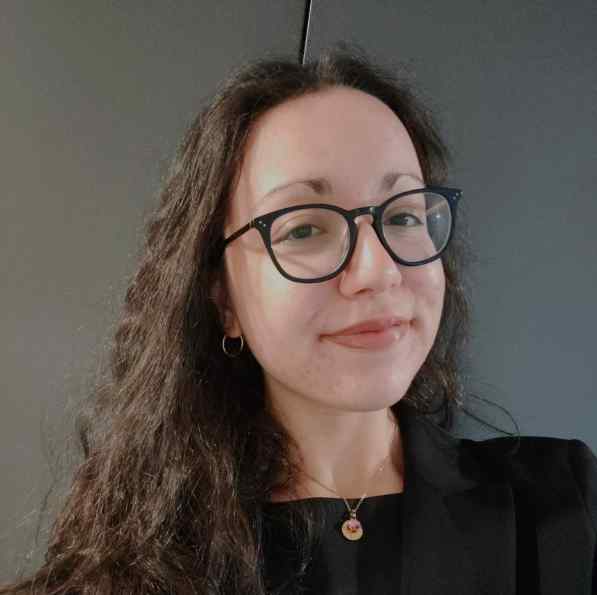
Claire Pace
I continued to develop essential skills such as organisation, time management, communication and teamwork. Although the concept of independent study was highly emphasised, there was never a lack of support available from staff and peers, and in fact we were highly encouraged to ask whenever needed.

Chong Woon Hui Crystal
he staff are supportive and approachable, and the University provides a wide range of modern facilities and support services to help students. It’s also a great advantage that the campus is located in the heart of the city centre, with easy access to shops, supermarkets and public transport.
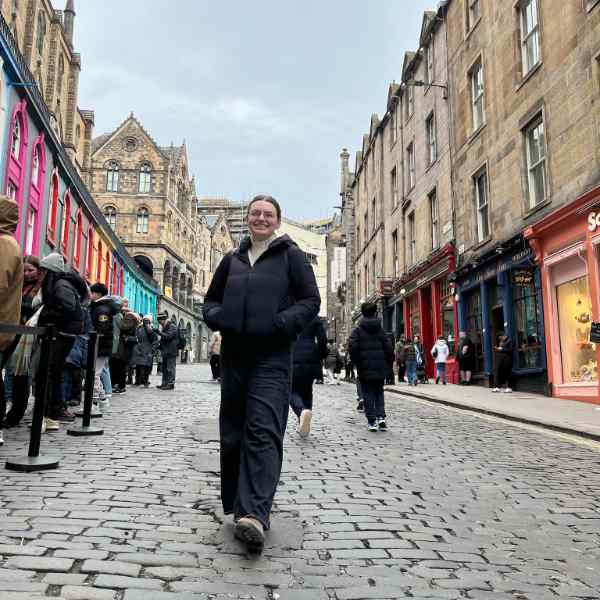
Madeline Smith
In addition to all the hands-on experience, working professionals were regularly brought in to lecture on their jobs and answer any questions. They were able to provide a real look into the current world of forensic science.

